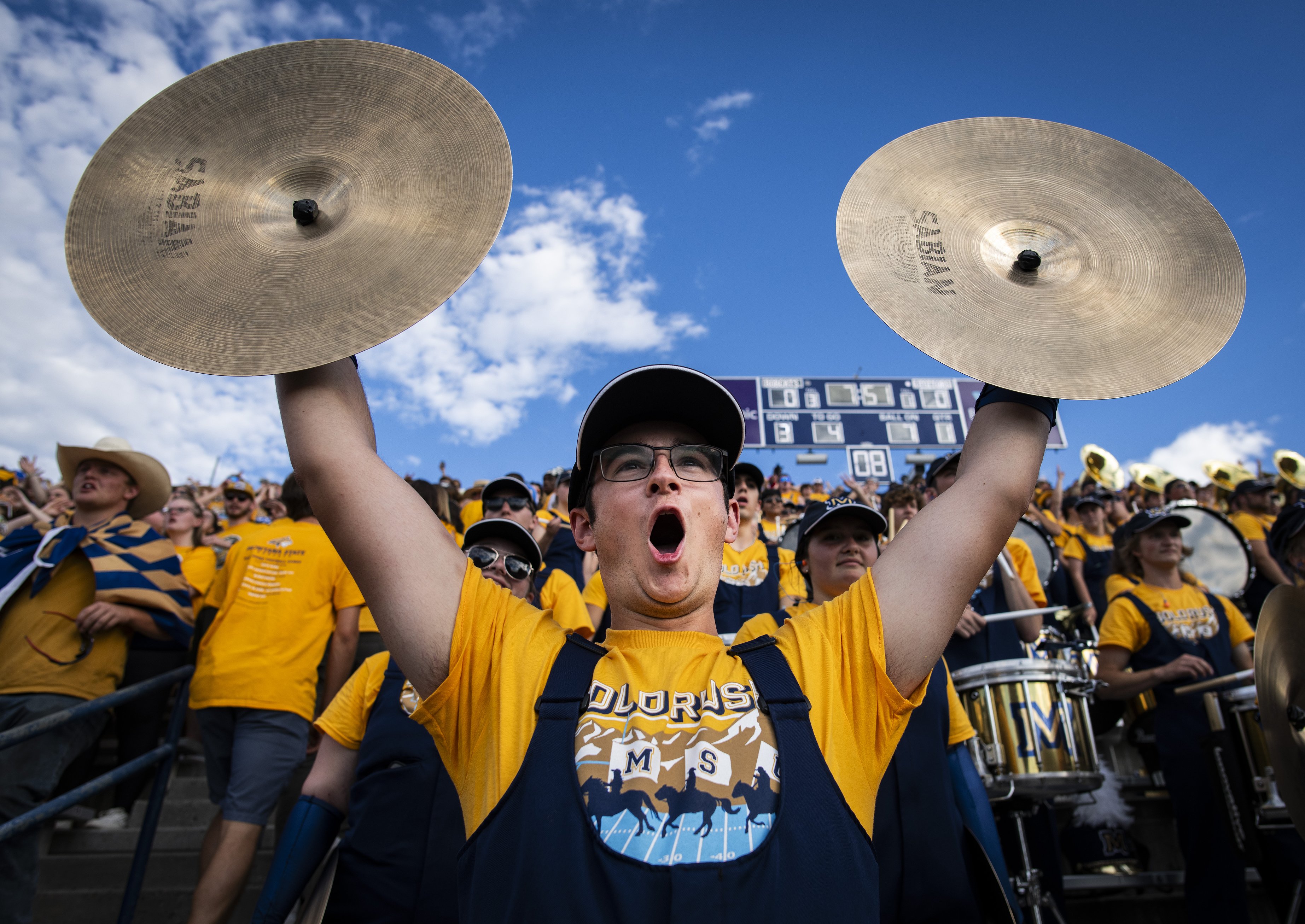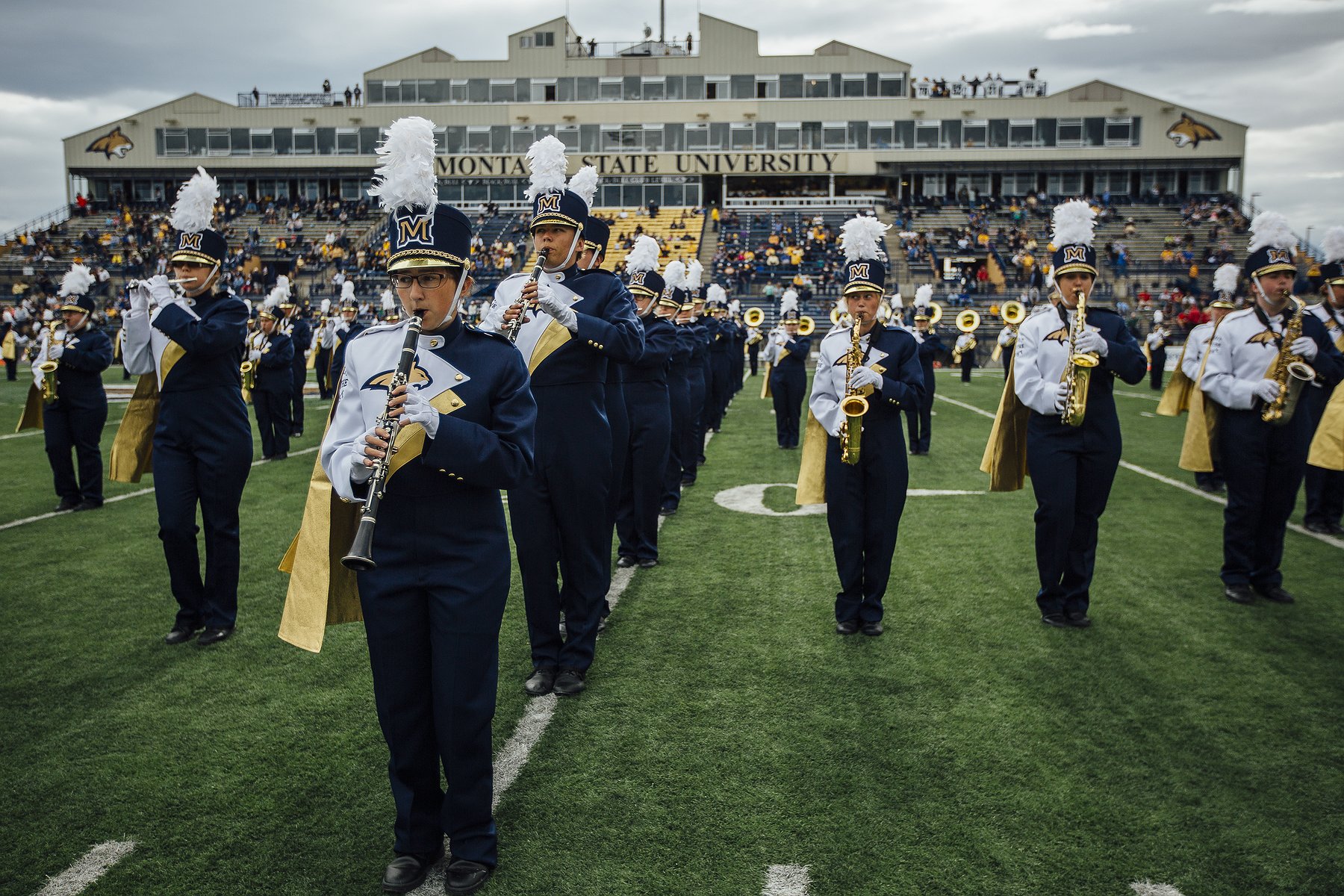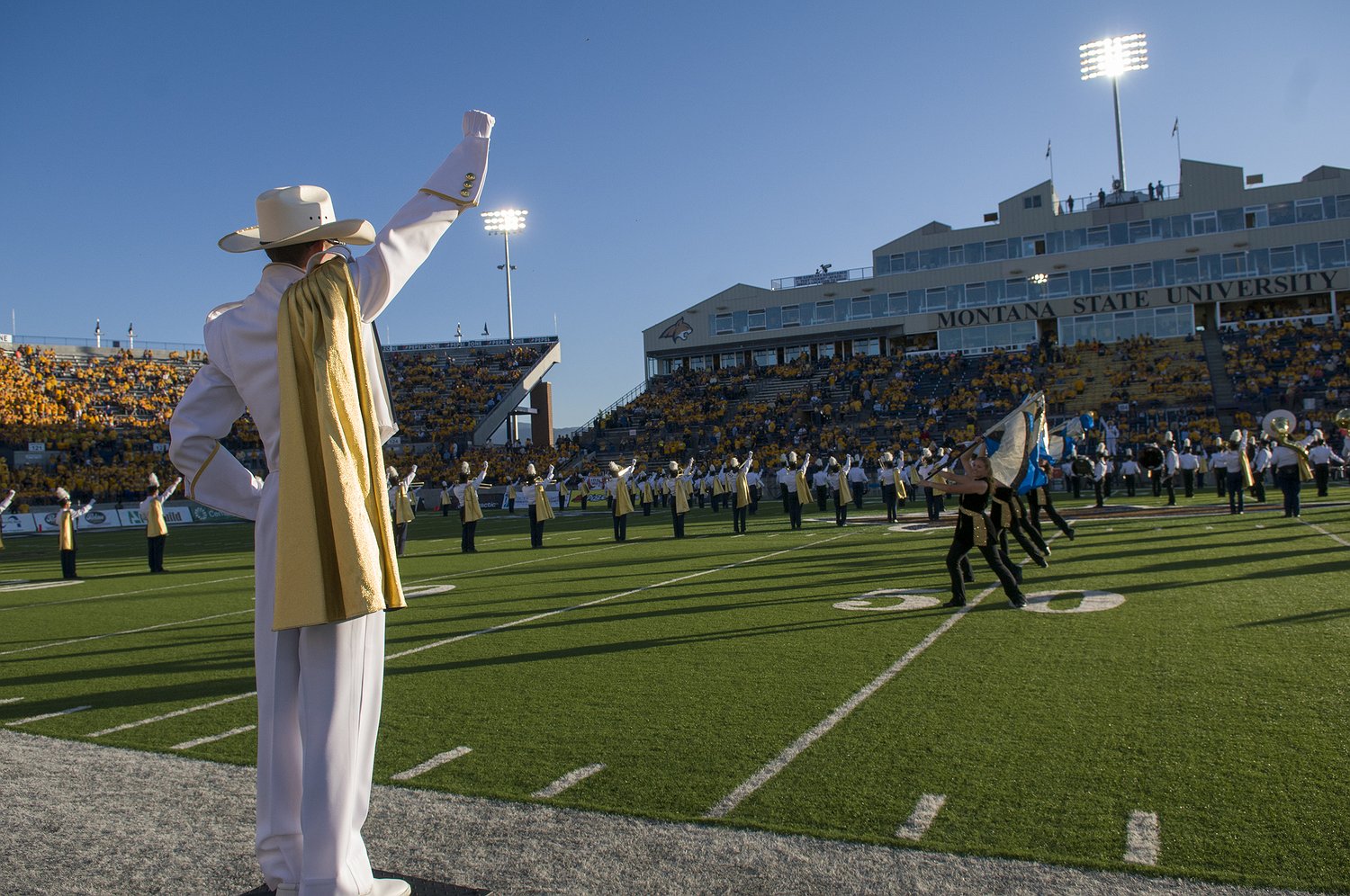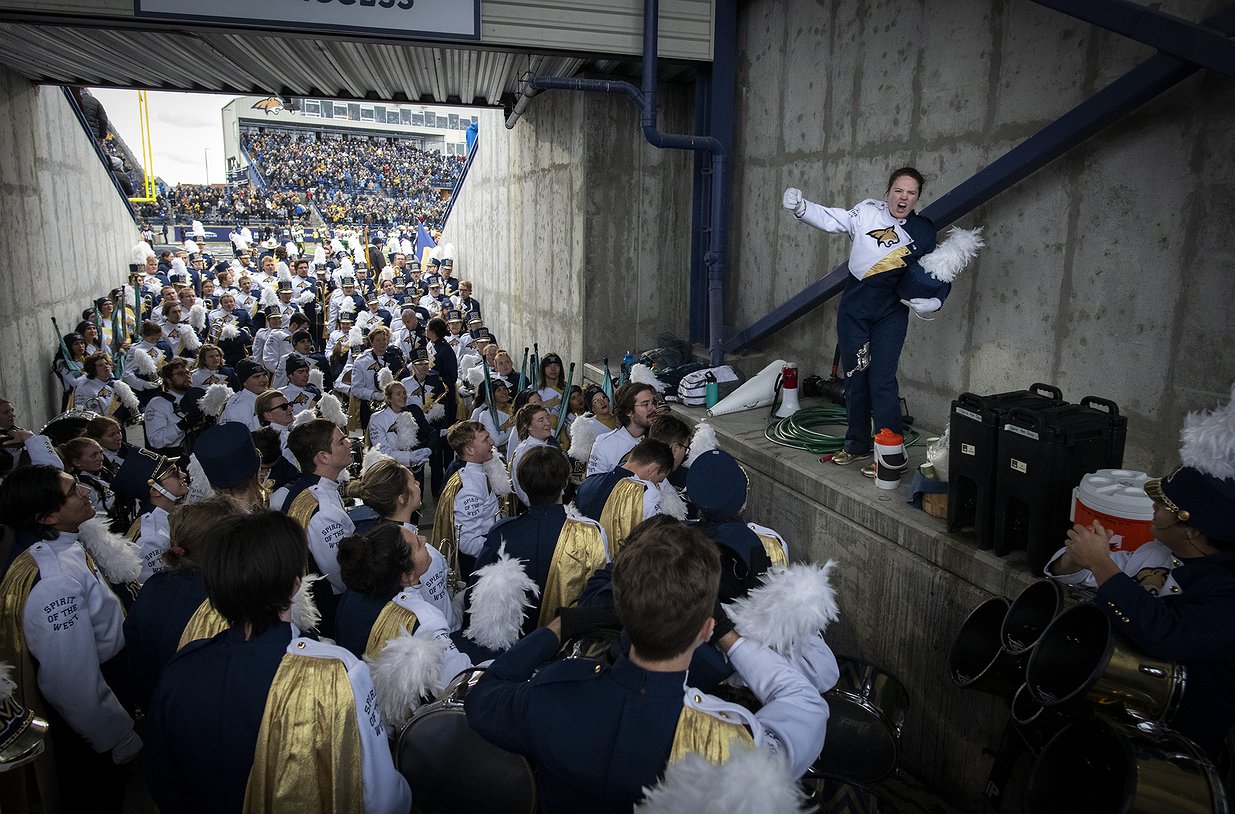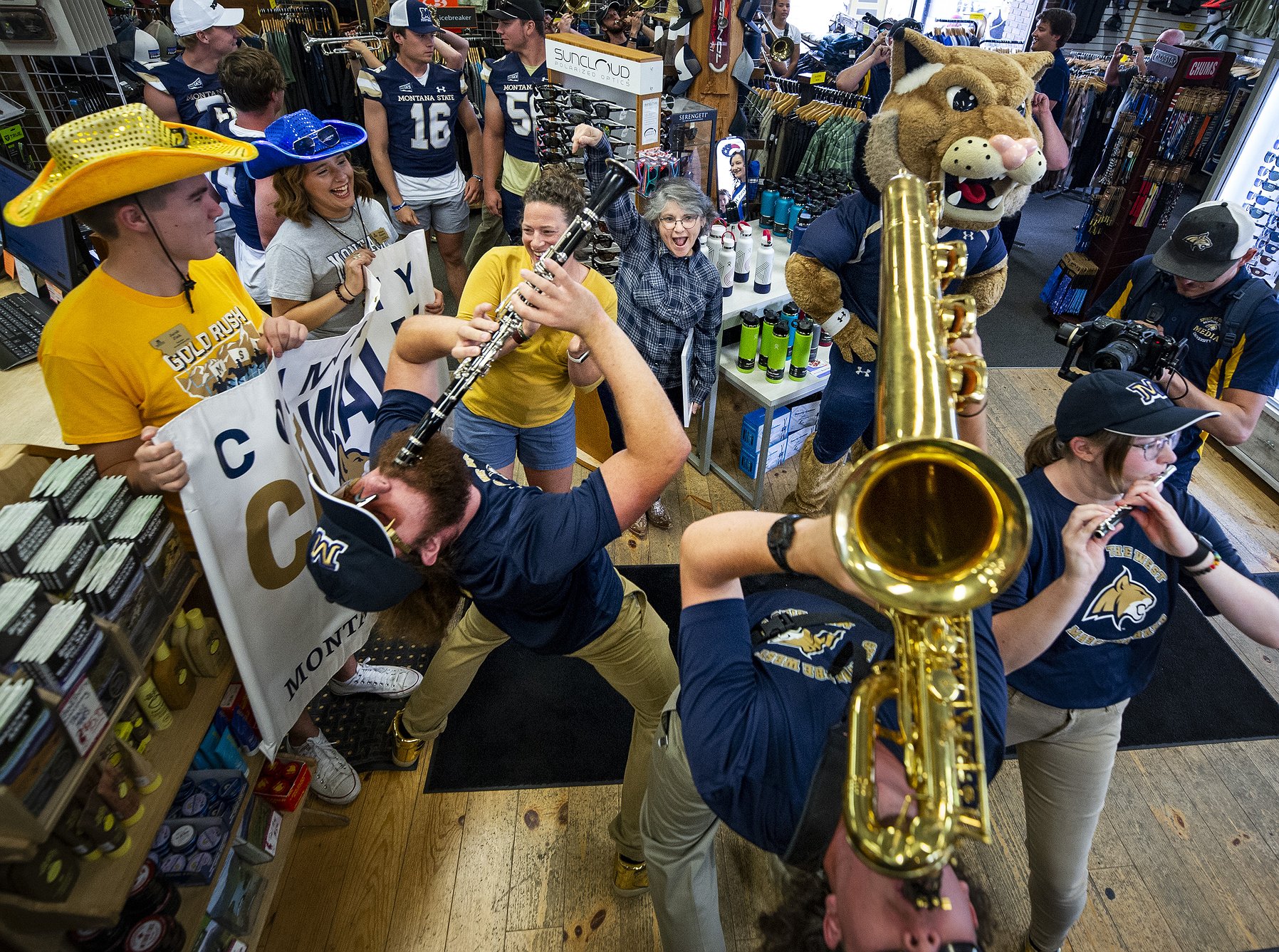Energizing the crowd: Spirit of the West marching band marks 40th anniversary
It’s nearly halftime of the Montana State University football game against Northern Arizona University and student drum major Frank Harney is standing with his back to a concrete wall in a tunnel of Bobcat Stadium, shouting at the top of his lungs.
He has the attention of the rest of MSU’s Spirit of the West marching band members, whose heads are bowed with their berets or plumed, cylindrical hats called shakos in hand.
“There may be a day when this stadium turns quiet,” Harney yells.
“But it’s not this day,” the rest of the band recites back.
Moments later, a drummer claps his sticks together and the band is playing, marching onto the turf.
Harney and co-drum major Dani Espiritu, who serve as student conductors, climb platforms on the east sideline as the rest of the nearly 200 band members, dressed in gold shoes, blue trousers, white tunics with blue and gold accents, gold capes and gold-brimmed blue shakos, scurry to their designated spots on the field.
Wearing white gloves, Harney and Espiritu gesture grandly to set the band in motion. Flags spin, plastic rifles twirl and the musicians belt out the first notes of “Take a Chance on Me” by the Swedish pop group ABBA, a song five years older than the Spirit of the West marching band.
Clipboard in hand, band director Nathan Stark, as associate professor in the College of Arts and Architecture, paces the sideline in a headset, glasses and winter coat. To the untrained eye, he may look more like a stadium worker than a band director.
“Once they take the field, it’s out of my hands,” Stark said.
The crowd is mostly on its feet, dancing and singing along. In the student section behind the south end zone, student band manager Payton Powell keeps an eye on the band’s roped-off area to make sure possessions and seats remain free from interference.
“Until you get into leadership, you don’t realize all the moving parts that are involved,” said Powell, one of the band’s roughly 40 student leaders.
Powell and the rest of the leadership are among the dozens, if not hundreds, of people, including students, faculty, administrators and donors, who help the band succeed as it celebrates its 40th anniversary.
Spirit of the West’s impact on the MSU community expands far beyond its marquee Saturday afternoon performances in the fall. The band functions as a place for students to meet and bond, aids in university recruitment and uplifts the environment at many campus events, not just sports games. And the students who participate earn college credit but treat their work like a job, which is quite often a very fun one.
The marching band’s season kicks off a week before fall semester classes with band camp, where students gather on campus for auditions and practice. Each member must demonstrate an ability to march while playing in tune. From there, the band more or less starts from scratch every year. New members must learn the pregame performance, and to march and play MSU’s fight song. Each year students pick the halftime music and help develop the show. This year, they performed songs from the movie “Shrek” during the first half of the season and switched to a collection of ABBA songs for the back half of the season.
Stark relies on student leaders to teach newer members how to play common tunes and march properly. The football field is broken down into a grid system. Every 5 yards is eight steps, making each step precisely 22.5 inches. Marching accurately is important when the large group forms MSU’s block M or other shapes, like dinosaurs, as it did for a “Jurassic Park”-themed show.
“Before they can even get to the point where I’m in front of them teaching them music, they have to have so much already set up and prepared,” Stark said. “Without those student leaders taking care of all that stuff, we wouldn’t stand a chance.”
Even before camp starts, the student leaders work hard to inventory uniforms, polish instruments and prepare for the upcoming season.
Roughly $250,000 worth of musical instruments harmonize as the wind and brass players crisscross the midfield logo during the halftime show, according to Stark. When he took the job in 2011, the uniforms were about the same age as some of the freshmen wearing them. Exposure to the elements — from 90-degree September days to below-zero late-season games — shortens the life of the band’s university-owned tools.
“We call it combustibles,” Stark said. “We don’t burn it, but in a sense, it gets used up. There’s only a certain number of times you can wear a T-shirt before it’s done. There’s only a certain number of times you can play a sousaphone in 10 below before enough wear and tear happens that it just needs to be replaced.”
And, during eight-hour game days, the band needs to eat.
Donors and the university fund all those expenses. Every student marching and playing ABBA on this fall day has a scholarship, in the form of a partial tuition waiver. Eventually, Stark said, he would like the band to be monetarily self-sufficient, potentially through additional alumni donations. On average, a student who plays for four years will receive about $8,000 in scholarships.
HAVING A marching band on campus also serves as a recruiting tool for the university. Jim Campbell was teaching music at MSU in 1980 when the old marching band’s funding was cut, forcing it to disband. At the time, MSU offered a music education degree but no performance-based music degrees, such as the music major that MSU now offers. Without being able to participate in marching band, students back then lacked experience when looking for teaching jobs after college, he said.
“We were at a disadvantage compared to other universities that had marching bands,” Campbell said. “We were desperate to create a new image.”
In 1983 the university held a contest that spawned the Spirit of the West name. Tim Salzman, who had led a small Illinois high school to multiple state titles and a national title in marching band competitions, was hired to direct the new band after a nationwide search.
Salzman implemented the pre-semester band camp. During his first practice as director on a September day, it snowed 6 inches. “I very clearly remember going to that first rehearsal wearing everything I owned,” Salzman said, but the students were used to the weather and excited to get started.
Salzman’s Spirit of the West began with roughly 100 members. He formed a color guard and grew the band to about 150 students during his four years at the helm before departing Bozeman for a job at the University of Washington.
In the decades since, the band’s membership has fluctuated. When Stark took over 12 years ago, the roster had dipped to 73 members. 2023’s lineup of 191 members just about matches the largest in the band’s history. The goal is 250 members.
To keep the tradition alive and ultimately recruit members, Spirit of the West works to promote marching bands around the state. Each October, it hosts a high school band showcase at Bobcat Stadium. The program began with just two bands and has grown to eight, and organizers would like to see participation double in the near future.
With Montana being large in area but low in population density, it’s difficult for smaller high schools to support a marching band, according to Stark. This, in turn, affects MSU’s ability to grow its marching band. However, Stark has already seen some of his former students go on to lead Montana high school marching bands. Espiritu, a junior studying music education and one of the current drum majors, plans to direct bands after graduating from MSU.
“The greatest thing about marching band is it’s a community,” Salzman said. “And that’s a community worth preserving.”
IMMEDIATELY UPON joining Spirit of the West, students become part of a large community with smaller subdivisions. Members spend a lot of time with others who play the same instrument. These sections practice together, march together and tend to eat pregame hot dogs as a unit. Their love for their instruments is obvious. Before and after practices, the students constantly blow into their mouthpieces, making music and practicing certain arrangements.
Only about 20% of band members are music majors, and each college at MSU is represented in Spirit of the West. Music majors meet music majors and engineers meet engineers in their respective classes, but marching band membership allows students to bond over music with someone they may not otherwise have met.
And marching band provides plenty of chances to bond. During the fall semester, band members spend 200-plus hours together. They practice three afternoons per week and play at home games and during playoff games.
During the spring semester, roughly 80 Spirit of the West members form a pep band to support the basketball teams. Pep band requires less time than marching band, allowing its members to focus on academics or perform with other bands and ensembles.
The Spirit of the West also plays during other university events, like Cat Walk — a parade of sorts through downtown Bozeman at the beginning of the school year to drum up Bobcat spirit — or at campus ceremonies. Students are rewarded for the long hours and extended practice time with the privilege of ripping notes on a trumpet inside a bank lobby or firing up the crowd at a holiday lighting ceremony.
“We like to say you may not enjoy every minute of your time in the marching band, but we hope you find something to enjoy every day,” Stark said.
Many of the band’s most memorable moments involve foul weather, a particularly special experience for Montana marching bands. The students look back and share war stories about frozen valves, broken instruments or cold fingers that resulted in a loss of dexterity.
Stark likes to tell the story of a football game in Missoula against MSU’s rival. It was death by a thousand cuts, he recalled. Buses were late, the band’s food was lost, there wasn’t enough room in the stands, the weather was poor, and MSU lost the game and conference title.
But at the end of the game, during its last performance, the band put all its frustration into the first note.
“It’s still the loudest thing I’ve ever heard,” Stark said.
Happier memories were made during the band’s trip to Frisco, Texas, for the 2022 national championship football game. The band flew on a charter plane; for some members, it was their first time flying or traveling out of state. They got to perform on a national stage. And the crowd was extra supportive.
“It was one of those electric moments where the band looked great and we sounded great,” Stark said. “The audience was totally in it and cheering us on. It was tremendous.”
Like many musicians, members of the marching band feed off the crowd. Following their halftime performance against Northern Arizona, the band members exit the field smiling and fist-bumping as the crowd hoots and hollers. Then, the smaller Third Quarter Band, a subset of the main band, strolls the concourses of Bobcat stadium, stopping to play a jazzy tune or the school’s fight song. Mothers stop with their young children to dance. A man plays along with a cowbell. In a gathering area behind the stadium suites, dozens of people clap in time as the musicians serenade the crowd of all ages. It’s the epitome of their work and the reason they put in the long hours in sometimes subpar conditions.
“It’s nice to go out and wow the crowd every football game and appearance,” Espiritu said.







